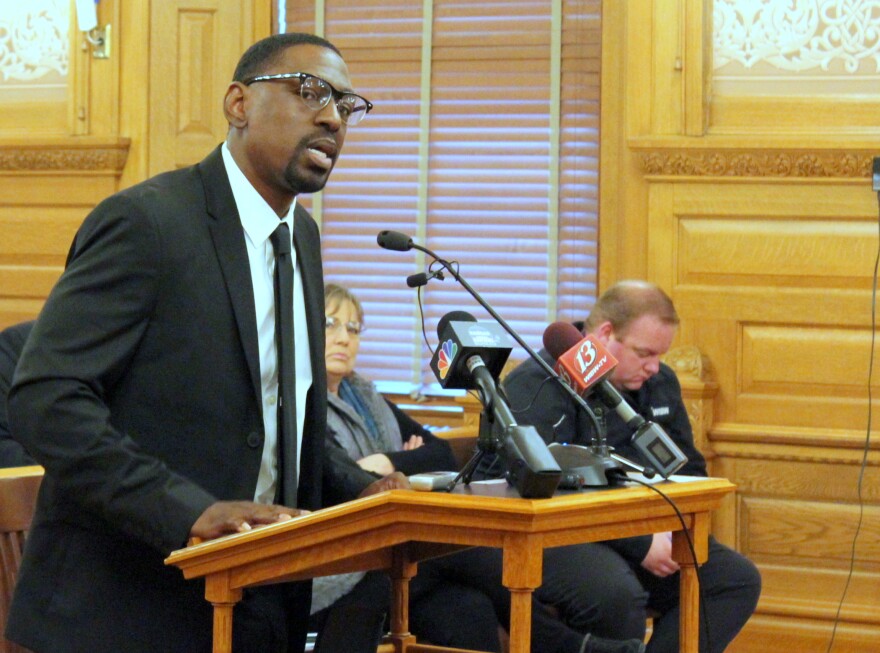A federal judge has declined to dismiss most of the counts in a civil lawsuit brought by Lamonte McIntyre and his mother over his conviction for a double murder he did not commit and his subsequent 23-year imprisonment.
The blistering 70-page ruling Tuesday by U.S. District Judge Kathryn H. Vratil came in response to motions to throw out the lawsuit by the defendants — the Unified Government of Wyandotte County; Roger Golubski, a now-retired Kansas City, Kansas, detective who was instrumental in framing McIntyre; and other policemen involved in the trumped-up investigation.
Although Vratil agreed to dismiss some of the lawsuit’s counts on technical legal grounds, she left standing most of the counts in the lawsuit, allowing the case to proceed to a possible trial.
Cheryl Pilate, one of the McIntyres’ attorneys, said she was gratified by the ruling.
“Lamonte and Rosie suffered enormously through the 23 years of Lamonte’s wrongful incarceration, and they look forward to presenting their case to a jury,” Pilate said in an email.
McIntyre was 17 when he was arrested in 1994 for the shotgun killings of Doniel Quinn, 21, and Donald Ewing, 34. He was convicted and given two life sentences. He was freed from prison in October 2017 after the two alleged eyewitnesses in the case recanted their testimony and the Wyandotte County district attorney concluded the case involved a “manifest injustice.”
Last month, the state of Kansas awarded McIntyre $1.55 million and a certificate of innocence under a new Kansas law enacted to compensate wrongfully imprisoned defendants.
In laying out the factual background of the case, Vratil was unsparing in her description of how Golubski acted to coerce witnesses into giving fabricated testimony and to railroad McIntyre.
“Since the early 1980s, Roger Golubski used his power as a police officer to exploit sex from vulnerable black women in the north end of Kansas City, Kansas,” Vratil wrote at the outset of her ruling. “To do so, he threatened arrest and prosecution, fixed tickets, made warrants disappear and paid money and drugs. He would often fixate on particular women, harassing them continually for months or even years. These predilections and abuses were well known among other officers and supervisors within the Kansas City, Kansas Police Department ('KCKPD'). They knew – and even joked about – Golubski’s practice of arresting black prostitutes, forcing them to have sex (often at the precinct house itself) and then releasing them without pressing charges.”

Golubski’s attorney, Morgan Roach, said he did not have a chance to thoroughly review Vratil’s ruling and declined to comment. Golubski, who retired about a decade ago as a police captain after more than 30 years on the Kansas City, Kansas, police force, could not be reached for comment.
One of the women Golubski exploited was McIntyre’s mother, Rose McIntyre, whom Golubski sexually assaulted at his police station office, according to Vratil’s recounting of the facts. Another officer who opened Golubski’s door and saw what was happening left without saying anything.
Golubski’s harassment continued over time even after Rose McIntyre rejected his advances, ultimately leading her to move to a new home and change her phone number in the hope he would stop terrorizing her.
In April 1994, Golubski ginned up evidence against McIntyre for the slaying of Quinn and Ewing as they sat in a parked car. Golubski coerced two women, one of whom he had a sexual relationship with, into identifying McIntyre as the killer. Both were pressured into picking out McIntyre’s photo from an array of five photos – three of which were of Lamonte and two of his close relatives.
Golubski and other police officer spent no more than six hours investigating the murders, Vratil said, before pinning them on McIntyre and arresting him.
Evidence later developed by McIntyre’s lawyers showed that the murder was committed by Neil Edgar Jr., better known as “Monster,” who worked for a local drug kingpin.
McIntyre and his mother filed their civil lawsuit shortly after McIntyre was exonerated in 2017. They amended the lawsuit in September.
The defendants “regularly engaged in improper and illegal acts to obtain unreliable and often falsified evidence for the purpose of closing cases and intentionally protected certain notorious drug dealers from arrest by wrongfully arresting other residents of the community for the dealers' crimes,” the lawsuit states.
The nine-count suit seeks unspecified compensatory and punitive damages for violations of the McIntyres’ constitutional rights and various state laws. While declining to dismiss most of the counts against the defendants, Vratil did agree with the Unified Government that, under Kansas law, it cannot be held liable for punitive damages.
Correction: An earlier version of this story said that Roger Golubski had sexual relationships with two eyewitnesses who identified McIntyre as the murderer. He had a sexual relationship with one of them.
Dan Margolies is a senior reporter and editor at KCUR. You can reach him on Twitter @DanMargolies.
Peggy Lowe is a KCUR reporter and is on Twitter at @peggyllowe.




